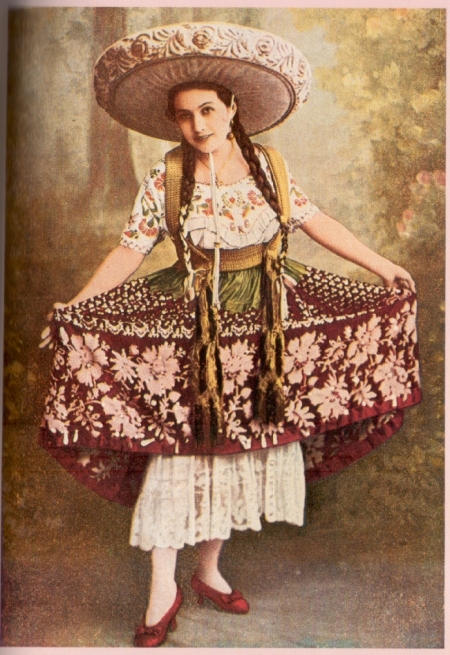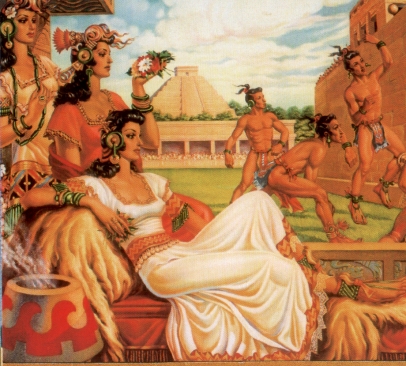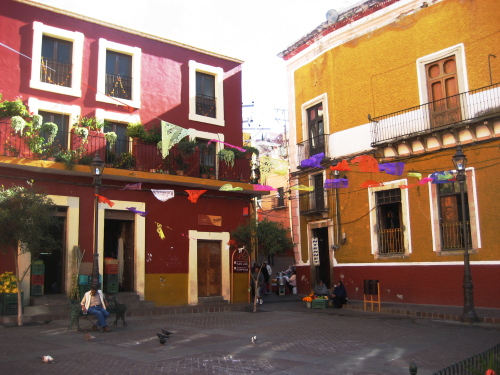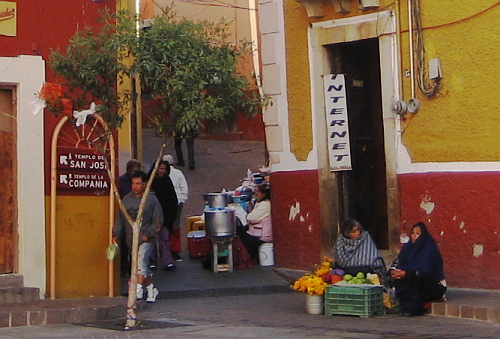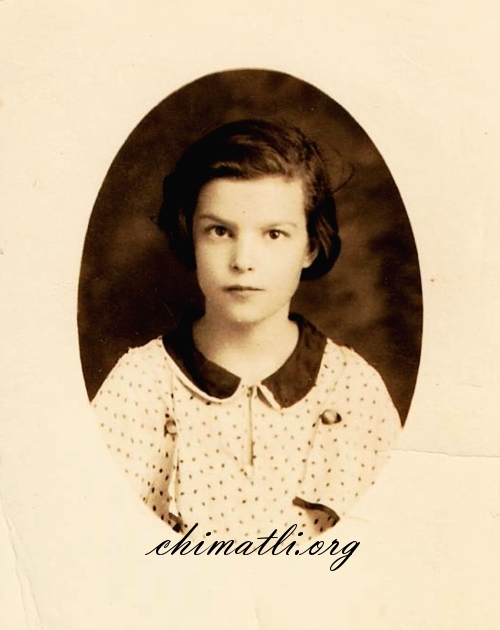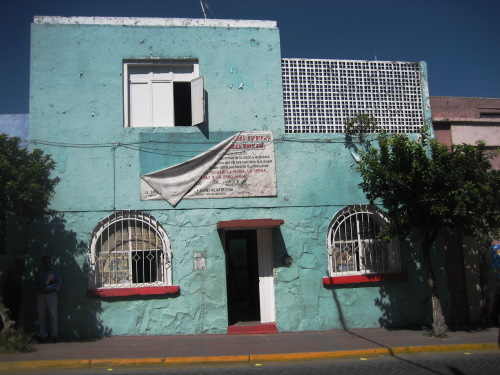An old favorite showcasing some of Mexico’s finest folk dances.
Category: Mexico
Mexican Nicknames or Los Nombres HipocorÃsticos
Male
Adolfo – Fito
Alberto – Beto, BertÃn, Tico, Tito,
Alfonso – Poncho, Fonsi, Chete, Moncho
Anastasio – Tacho
Ãngel – Gelo
Antonio РTo̱o
Apolinar – Polino, Poli
Armando – Mando
Arturo – Turi
Auxilio – Chilo
Basilio – Chilo
Benjamin – Benja
Eduardo – Lalo
Eleazar – Lalo
Emilio – Milo
Enrique – Quique
Ernesto – Neto
Ezequiel – Cheque
Federico – Fede, Quico
Fernando – Nando
Florencio – Lencho
Francisco – Paco, Pancho, Chicho
Gabriel-Gabi
Gonzalo – Chalo
Gregorio – Goyo
Guadalupe – Lupe, Lupillo
Guillermo – Memo
Gustavo – Tabo
H̩ctor РTeto
Horacio – Lacho
Ignacio – Nacho
Inocencio – Chencho
Isidro/Ysidro – Chilo
Javier – Javi
Jes̼s РChuy, Chucho, Chus
Jes̼s Emilio РChumilo
JoaquÃn – Chimo
Jose – Pepe, Chepe
Jose Maria – Chema
Juan Gabriel – Juanga
Juan Manuel – Juanma
Lorenzo – Lencho
Luis – Huicho, Lucho
Manuel – Lolo, Manolo, Manu
Moises – Moi
Narciso – Chicho
Pedro – Perico
Rafael – Rafa
Ramon – Moncho
Refugio – Cuco
Roberto – Beto
Rodrigo – Ruy
Salvador – Chava
Santiago – Chago
Senovio – Noyo
Sergio – Chejo, Checo
Vincente – Chente
Female
Alejandra – Ale
Alicia – Licha, Ali
Antonia РTo̱a
Asencion – Chon, Chona
Beatriz – Beti, Tichi
Carolina – Caro, Lina
Cecilia – Chila, Ceci
Concepción – Concha, Conchis, Chona
Consuelo – Chelo
Dolores – Lola, Loli
Elena – Leni
Elisabet – Eli
Esperanza – Lancha
Eugenia – Maru
Florencia – Lencha
Francisca/Franchesca – Paquita, Pancha
Graciela – Chela
Guadalupe – Lupe, Lupita
Guillermina – Mina, Guille
Hortencia – Tench, Tenchi
Isabel/a – Chavela
Josefa – Pepa
Josefina – Chepina
Lourdes РLul̼
LucÃa Fernanda – Lucifer (!)
Luz – Luchi
Magdalena – Magda, Nena
Marcela – Chela
Margarita – Margo, Mago
MarÃa Elena – Malena
Maria Eugenia – Maru
MarÃa Isabel – Maribel
MarÃa Luisa – Marisa
MarÃa Soledad – Marisol, Sole
MarÃa Teresa – Maite
Matilde – Tilde
Mercedes – Meche, Merce
Montserrat – Montse
Patricia – Pati
Raquel – Raki, Raque
Ramona – Mona, Moncha
Rocio – Chio
Rosario – Chayo, Charo
Silvia – Chivis
Socorro – Coco
Soledad – Chole
Teresa – Tere
Trinidad – Trini
Victoria – Toya, Viky
Yolanda – Yoli
I made some exceptions but this list is mostly comprised of nicknames which are somewhat different than the original name. I didn’t include too many of the fairly obvious ones i.e. Vero for Veronica, Trini for Trinidad, Nico for Nicolas etc. I also tried to stick to the traditional nicknames but included some of the modern versions for a few. There are many more of the Maria-plus names which I might add in later.
Also, it is somewhat humorous for non-Mexican Spanish speakers, but Mexicans tend to make many words diminutive including nicknames. So Concha becomes Conchita, Pepe is called Pepito and so on.
This is an excellent article that explains it all (Spanish): “De Alfonso a Poncho y de Esperanza a Lancha: los HipocorÃsticosâ€
Interesting piece in Spanish from a Basque persepctive, it gives some background on the prevalence of “ch” in the names: El Valor de la Letra “Ch”
For some interesting background on the English nicknames i.e. Molly, Sally, Hank…check out this site.
Thanks to Frances, Diego, Jimmy, El Chavo, Don Quixote and Julio for your help in compiling this list. I found many of the names through internet searches which was a surprise to me. Just two years ago when I first set out to make this list, there was nothing on the web to be found.
Mexican Names, Part One
17 March 2019: Quick update, I just came across this blog post, Nicknames in Spanish by Mark Robert Alexander which discusses how Mexican nicknames can be confusing for those unfamiliar with the nickname etiquette. I recommend the article if you’d like a bit more information on the topic.
16 August 2019: Added a few more names.
Mexican Names
I was thinking about a friend I had in elementary school named Eduviges. She was from Tijuana. Eduviges means “fighting woman.” We called her “Dube” (in Spanish) for short.
Copied over from a Myspace blog post from 2007:
In a life long ago, I worked in a bank and tried to find numerous ways to entertain and guard myself against the tedium of “Next customer, please!” One way was to collect interesting names in Spanish.
Here are a few:
Atendoro Coyotl
Emeterio
Austreberto
Fructuoso
Pastora
Clorindo
Wenceslao
Fidencia Matlacuatzi
Gumercindo
Agapito
Perhaps these names were popular two centuries ago and managed to survive in sheltered pueblitos or they’re names of unpopular saints, quien sabe? They’re immensely preferable over the much too popular “Juan” and “Jose.”
Speaking of which, I’ve been trying to figure out for years which nicknames go with which proper names. So far I’ve got:
Juan=Paco
Jose=Pepe
Enrique=Kike or Kiki
Socorro=Coco
Luis=Lucho
Lourdes=Lulu
Guillermo=Memo
Can’t think of any others at the moment. Anyone else?
——————————————————–
Frances had these to add:
nicknames…in my family
luis…huicho
sergio…checo
frances/francisca…pancha/pachita
gustavo…tabo
veronica…bero
weird names
Hermila….(people call her Milly for short, weird). my mom
Avigail…(Avi for short) my grandmother”
Thanks Frances!
———————–
I wrote this in 2007 and had hoped to come up with a definitive list which sorta got pushed to the backburner. If you know anymore, please leave your submissions in the comments section and I will try and compile them all for one post. Thanks!
———————
Forgot to add this in from my follow-up post. Ask A Mexican covered this question too!
Dear Mexican:
How do Mexicans get such ridiculous nicknames from seemingly normal names? For instance, Jose becomes Chepe, Eduardo is Lalo, Gabriel becomes Gabi, and Guillermo devolves into Memo.
It’s Marcela, Not ChelaI want to know why Mexicans have such incongruous nicknames. In English, people have nicknames that have some relation to their given names—for example Kenny is the nickname for Kenneth, or Jenny for Jennifer. Granted, there are some nicknames that seem like a stretch of logic, like Jack for John and Peg for Margaret, but there are none so incompatible as Pepe for Jos.., Pancho for Francisco, or Chucho (or Chuy) for Jesus. I have asked many Mexicans about this and they all tell me, “Porque as.. es,” so I finally decided to ask THE Mexican.
La China Curiosa Who’s Really KoreanDear Wabette and Chinita:
The definitive study on this quirk remains Viola Waterhouse’s “Mexican Spanish Nicknames,” included in the 1981 anthology Linguistics Across Continents: Studies in Honor of Richard S. Pittman. Unfortunately, the ethnolinguist devotes most of her article to including as many seemingly wacky Mexican apodos as possible (some of the better ones mentioned are Goyo for Gregorio, Licha for Alicia, Nacho for Ignacio, and Cuco for Refugio) instead of theorizing why Mexican Spanish is prone to such a mangled morphology. Waterhouse does identify one phenomenon that factors into many of these name changes: palatalization, when speakers pronounce non-palatal consonants as palatals—for example, the transformation of s into a ch sound when Salvador becomes Chava. Other phonetical laws not mentioned by Waterhouse that influence Mexican Spanish nicknames include apocopation (the dropping of a word’s last letters or syllables—Caro for Carolina), apheresis (when a word loses syllables or letters at its beginning—Mando for Armando) and syncopation, when a word contracts by shedding sounds—that’s how Roberto becomes Beto.But the question remains: Why the dropping of sounds and letters in Mexican Spanish nicknames? This Mexican’s take: most nicknames derived from proper nombres are shortened versions of the original. Mexicans advance this process by employing the above-mentioned tricks. Such trends occur in languages that are evolving into newer, bolder tongues. So enjoy your pussy Billys from William and Cathys from Catherine, gabachos: Mexicans will take the linguistic wonder that is creating Lencho from Lorenzo any day.
Plaza Baratillo
Knowing Eyes
Secret Disco: We Are Magic
Exuma-Obeah
I think Sunday is a good day to post this song because if I believed in the sacred, this song would be it. This music is what religion should be: visceral, calling to a power outside and within oneself. It is dripping with magic.
A couple of months ago I traveled to Guanajuato, MX with friends and through one of these friends, met the drummer for the only punk rock band in the city. We spent the night chatting in this cave-like bar filled with hip youth from the nearby college. It was a warm, gothic-y place lined with red velvet wallpaper and playing the latest indie tunes from around the world. The energy of this punk rock guy, appropriately nicknamed Godzilla or Godzi for short, was intense and heavy. So looming was his presence that his entrance into the bar caused the students sitting around us to look nervously over their shoulders. He could make the rock walls of the building we were sitting in feel threatened, so formidable was his presence.
With a beer in hand he began to tell one story after another, breathlessly, continuously, hours passing quickly, each story revealing his wry sense of humor and unexpected wisdom. Finally, in a rare pause of the conversation, I asked him if he’d ever been to Veracruz. His eyes glowed for a moment, remembering. He said in Spanish: Yes, that is a beautiful city, full of magic. Magic? I asked, Real magic? Not magical? Magic, he says. There is magic in the earth there, it is a special place. Different cities in Mexico contain all kinds magic, some places it is stronger. For instance, near Leon there is a town which is very dark, there is bad magic there. You don’t want to visit this pueblo…but I go occasionally. A small moment of silence passes and he grins, leaving me to wonder what he does in the bad magic pueblo. Then his words rumbled off into a subterranean place of slurred speech and I sank back against the crumbling rock walls wondering how long the night lasts in Guanajuato.
I immediately thought of this story when I heard first heard this song, there is magic here. It is up to you to decide what kind of magic it contains.
I got the voices of many in my throat
the feet of a frog and
the tail of a goat
According to book The Secret History of Disco and comments left on the Youtube page for this tune, this song was popular at early disco clubs in New York. It was part of a musical trend that included other African inspired music like Babatunde Olatunji.
Secret Disco: Roller Boogie
Bisquit-Roller Boogie
I tried my best to resist the lure of this video which I was first introduced to through artist Porous Walker‘s Facebook page.
What is it exactly that I find so lovable about this song? Is it the synthy Hi-NRG beats, the hypnotic vocoder robot vocals, the infectious chord changes, the catchy chorus backed by samba shakers, the requisite hand claps, the unrelenting bass line, the melodic alarm clock beeps taken from a children’s cartoon all topped by a perfectly timed cowbell pop? Or is it the video itself with the Chrissy Snow dancers, so vapid and rhythmless (you can see them counting beats in their head) following a choreography that means absolutely nothing to them cause all they are smiling about is the cocaine they were promised after the video shoot? Did Cicciolina find her inspiration here? Xuxa?
Continue reading
70 Years Separate Our Footsteps
It wasn’t difficult to find this house in Guadalajara, the former home of my great-grandmother Sara Ybarra Ramos. She never knew I existed and I knew nothing of her until my father shared some family letters with me earlier this year. But now, I have this connection to her – we have both traversed the same pavement, 70 years separate our footsteps.
(Light posting due to a long needed vacation in Mexico)
November 9, 2009
You might’ve noticed the picture now is of a different house. I went back to the house to find more information and to ask around if anyone had information on my family and realized I had the wrong house. It was on the same street and the correct number but the street name had changed. Luckily, the correct house was only blocks away and interestingly, near the city courthouse.
My great-grandmother’s old house is now rented by a friendly social justice lawyer who recently took over the space and plans to rehabilitate the building as it is in extreme disrepair. Neither he nor the abarrotes across the street knew of any Ybarra families in the area. The lawyer did mention something about chocolate…
Front hallway of the building
Mysterious Found Note
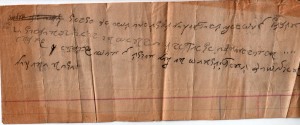
(click on image for larger size)
I found this slip of paper in a 1907 book called ‘Historia Patria’ from Mexico. I had been curious about what language the note was written in and asked about it a few years ago when I was blogging on Myspace (gasp!). A friend did his best to try and make out the script and used this nifty website to try and determine the language. http://www.unicode.org/charts/
My theory now is that is was written by someone who was trying to copy letters out of a book and probably was not accustomed to using a writing instrument. I can imagine someone picking this book up and attempting to write without instruction. The strange gnarled letters was their interpretation of what they saw on the page.
Yaqui Deer Dance
As mentioned in a previous post, a few weeks ago someone asked me if I was Native American and I answered as I often do, most people of Mexican heritage have some indigenous heritage. I think they meant Indian from north of the US border but like lots of indigenous folks, I don’t recognize these borders when it comes to culture. I was told my maternal great-grandmother was Yaqui Indian and my mother says she remembers hearing Yaqui words as a child. So in honor of my indigenous heritage, I present this video.
Yaqui Deer Dancer Yes, that is a deer head on his.
The clip is of an important ritual tradition called the Deer Dance. The festival where this dance took place was intended to bring Yaqui tribes from both sides of the borders together to celebrate their culture. There is some debate as to whether it was appropriate to film the ceremony and post the clip on Youtube. As the dance was a demonstration and not a ceremony, it seems approriate as a method to educate others in Yaqui culture.
Yaqui: Danza del Venado en Sonora, Mexico
Yaqui prefer to call themselves “Yoeme” and their homeland is “Hiakim.” It is their homeland name that most likely gave rise to the term Yaqui.
